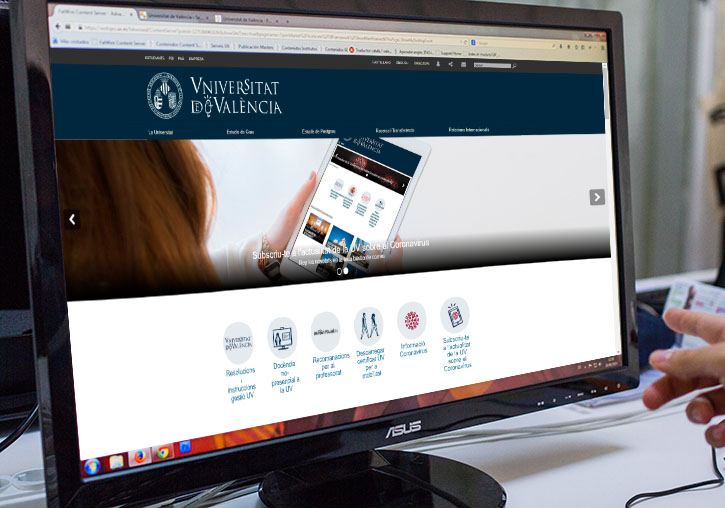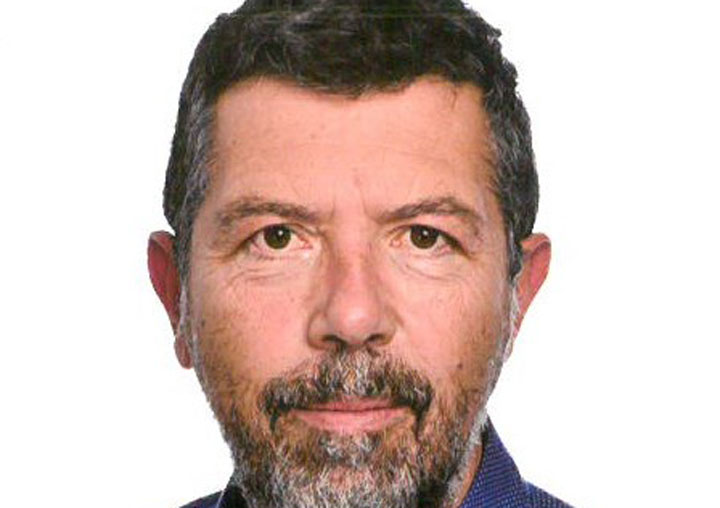UV resumes its activity without presentiality
- Office of the Principal
- March 23rd, 2020

In the context of the alert state announced by the Spanish government, the Universitat de València resumes on Monday 23 March its activity, which is characterised by a minimal presentness of people in the university buildings: 1.75 % of permanent staff, especially in tasks of telematic and remote work preparation.
Monday 23 March the Universitat de València resumes its teaching, research and management activities in unique and exceptional circumstances, which result from the health emergency stated in Spain in the context of the COVID-19 pandemic.
We outline the current situation with the aim at providing information to the university community.
Objective: zero presentiality
In the mail sent to the university community by the principal of the Universitat de València, Mª Vicenta Mestre,she noted that 'the most important is people's health' and because of this she set the objective of 'achieving zero presentness of people' in the facilities of the Universitat.
Thus, the resolution of the office of the principal on 16 March provided, among other measures:
-
Access limitation to the Universitat's buildings and a reduction of the mobility within the buildings to what is necessary, as well as the cancellation of the postal interoffice mail services;
-
Customer service only and exclusively by telephonic and/or telematic means;
-
Implementation of special measures for highly vulnerable staff;
-
Establishment of Contingent Plans for the Continuity of the activity of each service and the structure of the Universitat de València.
The data from Monday 23 March indicate that only 1.75% of the staff of the Universitat de València has been sometime during the day in the university buildings.
The buildings of the Universitat de València, which are open to this day, have limited access. The presentness of staff in the Universitat de València has been minimal, mainly linked to the collection of equipments and materials, the diversion of fixed telephone lines to mobile terminals, and the automation of computer equipments to initiate telematic and remote work established in the 66 contingency plans for the continuity of the university activity that have been established by the office of the general manager of the Universitat.
Additionally, regarding the companies that provide services, the instruction 4/2020 of the Office of the general manager of the Universitat established the regime of service delivery by companies in the areas of opening, access, security, maintenance and cleaning the facilities of the Universitat de València.
Regarding cleaning staff, in relation to an ordinary working day, 8% of the services were provided at Blasco Ibañez Campus, 19% at Tarongers Campus, 79% at Burjassot-Paterna Campus and 50% at research structures and facilities of the Science Park, and there has been no activity at the sport facilities of any campus.
These data are explained by the disinfection tasks carried out throughout the day, the reinforcement of cleaning at spaces with access to people the cleaning prior to the closure of some buildings in the coming days.
In access control, there has been no service at the sport facilities, which stay closed, and at each campus, and in relation to an ordinary working day, 14% of service was provided at the Blasco Ibañez Campus, 15% at Tarongers Campus, 100% at Burjassot Campus and the services took a normal course at the facilities of the Science Park.
The different levels of access controls result from the need to open all centres, in many cases in reduced time frames so that all staff could access the buildings to collect the material needed to work from home, as well as to ensure access for cleaning tasks.
Moreover, the higher level of access control at the Burjassot-Paterna Campus is also related to an incidence in access control with the mechanisms of the ID readers and to the maintenance of access to research institutes and essential services.
Over the coming days, this activity will be reduced in line with the objective of zero presentiality at the Universitat de València, paying particular attention to the maintenance of facilities and with the exception of security staff, who will be full effective to guarantee the integrity of buildings and facilities of the Universitat.
Objective: to ensure that no one is left behind
The current health crisis will have a great economic and social impact, according to the forecasts of the authorities.
In order to minimise this impact, and within the scope of its possibilities and competences, the Universitat de València has agreed:
-
To define as essential a group of services to be provided preferably in a telematic way, but not necessarily face to face in order to guarantee certain key functions with economic consequences for the people of the Universitat and its society;
-
Thus, the payrolls and social security areas have been determined as essential services, to guarantee the payment of remunerations of the staff of the UV;
-
To determine also as essential the services of human resources (PAS and PDI) to manage the tasks requiring people's contract renewal;
-
To incorporate as essential the services of accounting and budgets, as well as administrative contracting, in order to maintain the payment flows to suppliers of the Universitat;
-
To maintain the currently existing contracts, although there is no effective service performance of the collaborating companies (access, security and cleaning), to avoid consequences for the workers of these companies that are service provider for the Universitat.
Taking into account that the economic capacity of many families could be affected, the Universitat de València is currently working in a set of measures that will allow the payment of pending enrolment receipts of our students when their economic situation or that of their families is affected by the exceptional measures of easing of the social and economic activities caused by COVID-19.
In this sense, the vice-principal of Studies and Language Policy, Isabel Vázquez, has pointed out that 'the main objective of the office of the principal is to stand on the side of our students: it has been this way in the past and it is now, even more in this special moment. We will make procedures and regulations more flexible to deal with situations arising from this crisis.'
Furthermore, the vice-principal also highlights the importance of being flexible and to deal with personal situations in the implementation of online teaching. She also says that the principal of the Universitat, Mª Vicenta Mestre, has referred to the Ministry of Universities and to the Government Delegation in the Valencian Community to ask them 'if it was possible to make an exception for the limitation of the mobility of people to those students who have in their residences during the school year their notes, books and even computers from their family residences.'
Besides that, together with the vice-principal of Internationalisation and Cooperation, Carles Padilla, the vice-principal insists on the highest possible flexibility for those students who were participating in mobility programmes and, in this context, have taken the personal decision of discontinuing their international activity.
This idea was reinforced by the vice-principals of Research, Carlos Hermenegildo, and of Academic Regulations and Teaching Staff, Ernest Cano, who have stated that, after overcoming the alert state, they will act flexibly in order to ensure that no one is aggrieved in this exceptional period that we are living.
Objective: to organise the university activity through Continuity Plans
The Universitat de València started working last 12 March in the development of Continuity Plans that would allow to guarantee the teaching activities in a non-presential way, the research activity with a presentiality as minimal as possible, and the university management in a telematic and remote way.
The establishment of the alert state on Saturday 14 March implied the acceleration of some of the measures that encouraged the deployment of these Continuity Plans for the university activity.
Thus, in order to resume activities in a telephone and telematic way, with the aim of achieving a zero presentness of people in the buildings of the Universitat de València, for the management structures and, according to their demand, a total a 20 new mobile phone lines have been enabled, 48 additional laptops have been provided to staff, 7 Internet connections in different forms, and throughout last week, the total number of VPN (virtual private network) licenses available for the university community has increased 100%.
Added to the measures taken on 13 March were those provided on 16 March once established the alert state, and an own regulatory structure and a schedule has been programmed to deploy the 66 Plans of Continuity that have been created.
All these plans imply that, in the short term of this week, all staff will be working remotely, in the form of teleworking, with the exception of specific moments in which they require access to documentation on paper, and in those minimal services of maintenance of the buildings and services of research support such as the animal facility of SCSIE and UCIM, and the aquarium and the greenhouse of SCSIE. Shift work has been established in these structures, which will affect 12.34% of staff, reducing the presentiality of 43.48% of workstations specifically linked to these services.
The principal of the Universitat de València has highlighted the great effort made by all people who, throughout these days, have been working to make possible a change in the modality of providing services to the most part of the workstations of the Universitat and she has thanked the commitment of all people who, from today, and through remote working, will continue maintaining the public services provided by the Universitat de València operative in this exceptional moment.
___
This information has been prepared by the institutional communication area of the Bureau of the Principal with data from the office of the general manager, the office of the deputy general manager for Human Resources, for Campus Management and Research Institutes Support Units, provided by the office of the deputy general manager for Economic Coordination and Services, as well as data from the offices of the vice-principals for International Relations, Research, Academic Regulations and Teaching Staff and Studies and Language Policy.
File in: COVID-19 , Viure a la Universitat
















